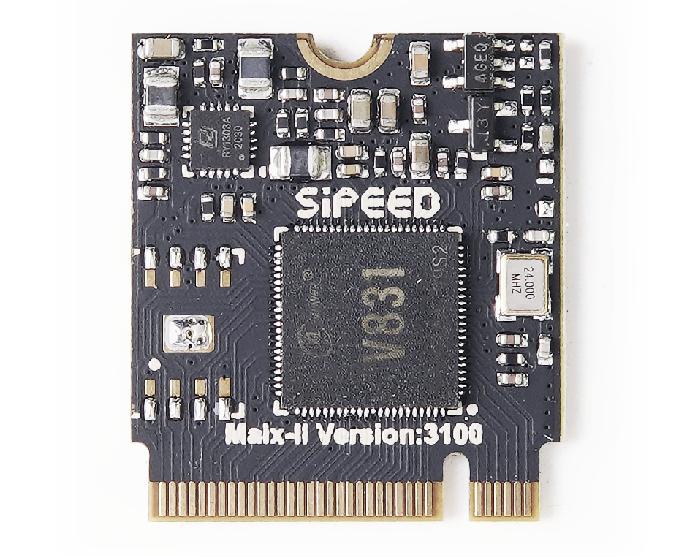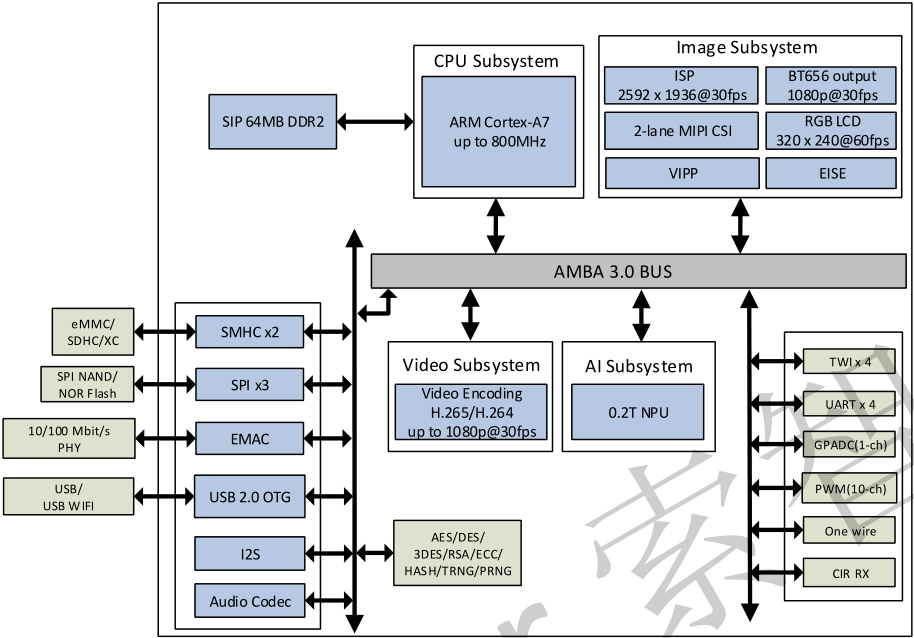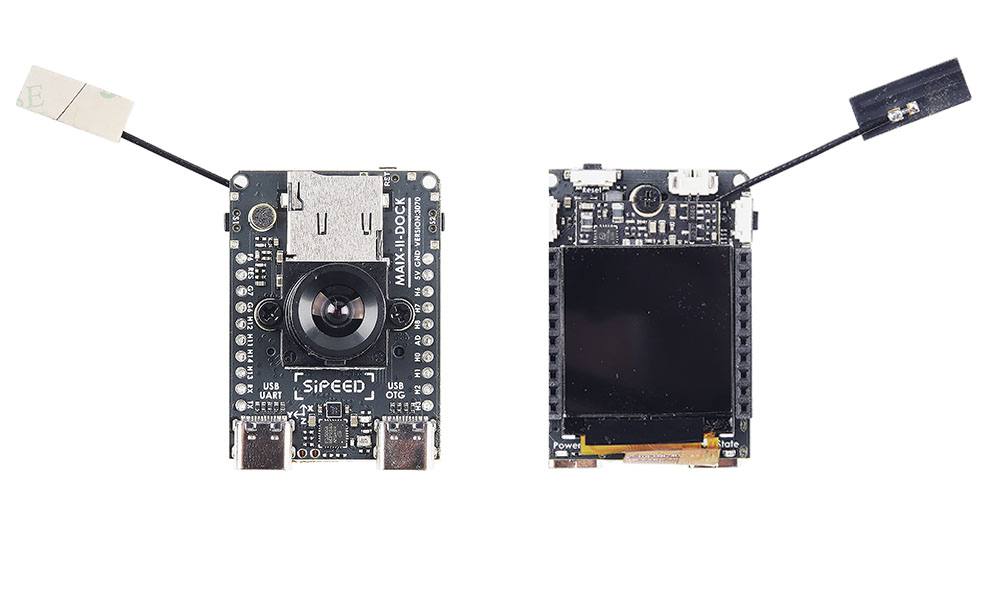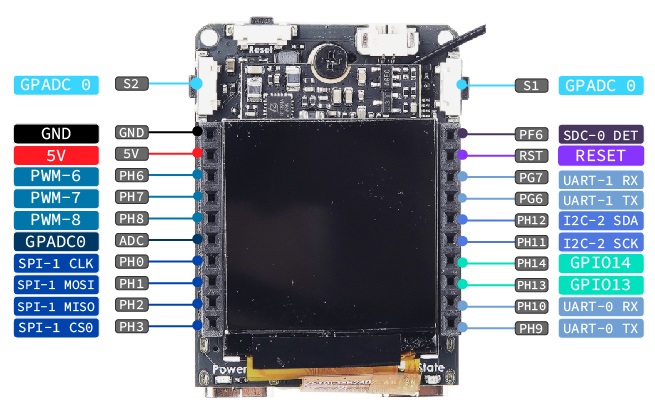Maix-II-Dock(M2dock) introduction
Maix-II-Dock is positioned as a cost-effective AIoT development board. While supporting conventional Linux development, it also has a unique AI hardware acceleration feature. With the complete software ecosystem provided by Sipeed, you can quickly realize your edge AI application.
- Hardware, based on the Allwinner V831 chip, the development board is formed in the form of [core board] + [ext-board]. You can use the development board directly, or you can use only the core board to design your own ext-board according to your needs, which is convenient and fast to complete the development.
- Software, in addition to directly using the datasheet provided by Allwinner for development (some datasheet may need to be obtained from Allwinner), Sipeed provides a very convenient Python SDK (MaixPy3) and C SDK (libmaix). It also provides an online model training service (MaixHub, which is more convenient for beginners to quickly train their usable AI models.
- Purchase: sipeed.aliexpress.com
M2 core board

Download hardware reference data from Sipeed_Maix_II_3101
V831 chip brief
Allwinner V831, single-core Cortex-A7 800MHz, 64MiB on-chip DDR2 memory, cost-effective SOC that can run Linux, and supports hardware AI acceleration (0.2Tops computing power), can be used as a normal Linux SOC, and can also be used for edge AI application. See the manual below for more detailed parameters.
Dataset: V833/V831 Datasheet V1.0.pdf
Chip structure:

M2 core board details
Compared with Maix-I generation
| Item | Maix-I (K210) | Maix-II (V831) |
|---|---|---|
| Main frequency | 400~600Mhz | 800~1000Mhz |
| Video encoder | None | H.264, up to 1080p@30fps H265, up to 1080p@30fps JPEG, up to 1080p@30fps |
| NPU | 0.23TOPS support Conv+BN+ACT+POOL |
0.2TOPS support Conv,Inner_Product,Pool,Eltwise,ACT,BN,Split,Concat |
| Memory | 8MB SRAM | SIP 64MB DDR2 |
| Storage | 16MB SPI Nor Flash | Choosable 16M flash(Blank default) |
| Camera | DVP, support 30W pixels max | 2lane MIPI, Up to 1080P@60fps |
| Display | 8bit MCU LCD | 8bit MCU LCD, can use other screen by convert board |
| SDIO | None | SMHC x2 (SDC0, SDC1) |
| SPI | SPIx3 | SPI x2 (SPI0, SPI1) |
| I2C | I2C x3 | I2C x4 (TWI0, TWI1, TWI2, TWI3) |
| I2S | 8bit I2S | I2S x1 (I2S0) |
| Ethernet | None | 10/100 Mbit/s Ethernet port with RMII interface |
| ADC | None | 1-ch 6bit LRADC for key |
| Audio | None | LINEOUTP + MICIN1P/N |
| Development environment | Maixpy/C | MaixPy3/linux |
Bottom board
Normally we think the screen panel is the front and camera is back.
 no
no
Download dock board hardware data Click me
Thanks for net users sharing the NGFF M.2 B-key footprint for Maix-II module
Dock board Specs

| Number | Maix II Part | Function | Note |
|---|---|---|---|
| 1 | M.2 B-KEY female slot*1 | Used for connect V831 core board | Have connected with core board when sold |
| 2 | Core board M2 copper column nuts*1 | Fix core board with bottom board | Have been fixed when sold |
| 3 | Power LED*1 | Show power state | --- |
| 4 | State LED*1 | User programmable led | --- |
| 5 | CPU Reset button*1 | Reset V831 chip | --- |
| 6 | User button*2 | Change IO voltage value,custom usage | --- |
| 7 | Wi-Fi module*1 | RTL8189FTV,adds Wi-Fi function for this board | SDIO Interface |
| 8 | BTB camera interface*1 | Connect BTB camera module | Have connected with bottom board when sold |
| 9 | Camera M2 copper column nuts*2 | Fix BTB camera with bottom board | Have been fixed when sold |
| 10 | FHD camera*1 | Default SP2305 Sensor BTB style, 1080P | Default 6mm focal length M12 lens,can use other Suitable camera |
| 11 | USB to UART chip*1 | Provide serial port communication | --- |
| 12 | Type-C interface(USB OTG) *1 | Used for V831 otg function | Can be used for power supply |
| 13 | Type-C interface(UART) *1 | Used for V831 uart debugging | Can be used for power supply |
| 14 | Three-axis accelerometer*1 | I2C interface,can read 3 axes acceleration data | --- |
| 15 | MicroSD card slot*1 | Connect microSD card | Default boot from SD card |
| 16 | LCD interface*1 | FPC0.5mm 24Pin,MCU interface | |
| 17 | IPS HD screen*1 | 1.3 inch IPS screen,resolution 240*240 | Have connected with core board when sold |
| 18 | IPEX Wi-Fi antenna connector | IPEX(first generation) Wi-Fi antenna | --- |
| 19 | Extension female header | Route V831 general IO,used for connecting peripheral | --- |
| 20 | Speaker connector*1 | MX1.25 2P interface(1.25mm pitch) | --- |
| 21 | Loudspeaker*1 | 8Ω1W 1609 composite aluminum membrane speakers | Have connected with core board when sold |
| 22 | Microphone*1 | Analog electret microphone | --- |
Resource summary
Hardware: MaixII Hardware Library
software:
- Python SDK: MaixPy3 software documentation
- C SDK: libmiax
- MaixHub model platform (AI model download, online training, project sharing): MaixHub
- Allwinner tina-V83x SDK: Tina-Linux/tina-V83x
- Toolchain: dl.sipeed.com or [github](https://github.com/sipeed/libmaix /releases/download/v0.1.0/toolchain-sunxi-musl-pack-2021-01-09.tar.xz)
Maix-II-Dock Getting Started Development Route Guide
- Because Maix-II-Dock runs linux system (tina-linx), so we need to learn to burn the system image first, just like learning how to reinstall the computer system, which helps us start over if you encounter problems, find the "Burn image" article in the left directory to view
- Learn basic Linux operations, such as how to open a terminal, basic terminal commands, and how to transfer files to the development board, such as serial port usage, adb usage, and other basic operations
- Select your development language:
- If you need to use AI functions, you can use it with the MaixHub online training platform, this platform provides AI model and project sharing function, save users's time.



 English
English Translate
Translate